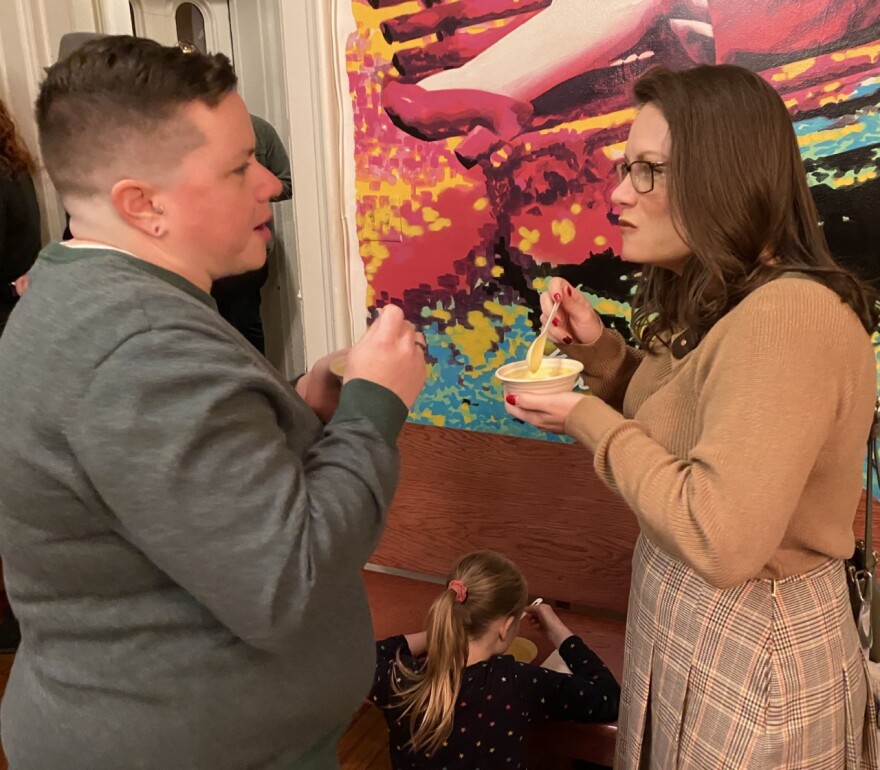Here’s a report on supporting friends and family who identify as neither male nor female and why it matters.
Thirty-five-year-old Hanna Windhorn identifies as non-binary and uses the pronouns they/them. The Fort Wright resident says they came out as a lesbian at age 16 but in the last five years has had a different realization.
“As I got older, I realized that I didn’t really fit into the stereotypical gender of female, but I never felt the need to physically transition my body. So obviously I never felt like I felt male. Then I started learning about gender studies and realized that there were people who identified as neither and that made a lot more sense to me because I feel like I’m neither male nor female, I’m something else,” said Windhorn.
Windhorn and fiancé Elise Sebastian who identifies as a lesbian plan to marry next month.

Windhorn explained what’s hard about identifying as non-binary.
“The hardest part is just existing in a world that’s so binary. You always feel outside. You always feel excluded. It can be stressful, and it can be disheartening. And I think some people even spiral into depression because of it,” explained Windhorn.
In the kitchen in their Northern Kentucky home the couple’s daughter 9-year-old daughter, Catherine is playing with a mini-drone she received as a Christmas gift. The family sits down to play a card game together and chat about the wedding. Catherine will be the ring bearer. Elise said their wedding will combine traditional with non-traditional.
“When we were meeting with our venue captain for the wedding, one of the requests we had was to make all of the bathrooms, gender-neutral for all of our guests. It’s really our opportunity in our little bubble of the world to make a stand,” said Elise.
Hanna and Elise spend a lot of time around people they know are supportive. Hanna tries not to take it personally when people are not supportive.
“I know that it’s not about me. I just say, “it is what it is” and move on,” said Hanna.
Elise said it’s exhausting to always be so understanding.
“To always be the one to show grace. To always be the one that is willing or flexible. Looking, and finding in our friends and other family members that there is support. Getting such positive loving feedback from people that maybe don’t even know us. Those types of things really help offset some of the things that could be otherwise detrimental,” explained Elise.

Support is important because non-binary and transgender individuals face a variety of stressors according to Dr. Joel Goodrich, a staff psychologist with the University of Kentucky Counseling Center.
“So if somebody is saying I don’t identify as male, I don’t identify as female, there’s a lot of assumptions that we make as a society and there may be ways people are pushed out or ignored or invalidated. Support matters because it can help a person potentially push back against this to some extent or bounce back or become more resilient,” said Goodrich.
Although the identifier non-binary has been around as long as civilization, if you feel like it’s becoming more mainstream recently, you’re not wrong.
Sara Ramirez plays the character known as Che Diaz, in the Sex in the City television show reboot. Diaz is the first non-binary character in the show’s history.
Recently NPR aired a report on non-binary students at women’s colleges wanting changes in admissions policies.
And figure-skater Timothy LeDuc is currently making headlines as the first non-binary athlete to qualify for the winter Olympics.
According to a 2021 study by researchers with the Trevor Project, one in four LQBTQ youth identify as non-binary.

Chris Hartman is Executive Director of the Fairness Campaign, a Louisville–based organization focused on preventing discrimination based on sexual orientation and gender identity. He said transgender rights have opened the door for the broader conversation about breaking down the binary.
“This is an incredibly important issue for them to be able to express who they truly are and not be bound by the two boxes that are typically available for folks, male and female. And look, drivers’ licenses, passports have already caught up on this. In the U.S., in many states including Indiana approved a non-binary drivers’ license option. You can mark X as a non-binary identification, instead of M or F. So, this is an issue I think our young people are really going to teach the rest of the world about,” said Hartman.
There’s nothing to be afraid of about finding out someone you love is transgender or non-binary. That’s according to Joan Deaton, author, and wife of a transgender woman.
“Love is really what’s most important here. And we really do need to accept these wonderful beings that have graced us with their lives,” said Deaton.
Deaton recommends showing respect, as you would for yourself and asking peoples’ pronouns to help create a safe space. In her new book, “Top 10 Trans Questions Answered By an Actual Trans Family”, Deaton lists several resources that can be helpful.
Meanwhile, Elise Sebastian and Hanna Windhorn said they’re grateful for all the love and support they have received.
“Support saves lives because without it you feel so alone and depressed and that’s not a good feeling,” said Hanna.
The couple plans to be married in February.





